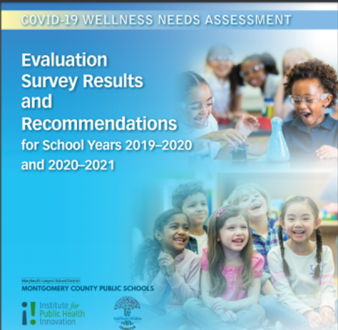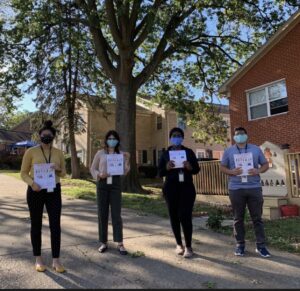Proposal Due By: March 17, 2023
Organizational Background
Founded in 2009, the Institute for Public Health Innovation (IPHI) is the official public health institute serving the District of Columbia, Maryland, and Virginia and one of over 40 such institutes within the National Network of Public Health Institutes (www.nnphi.org). IPHI creates partnerships across sectors and cultivates innovative solutions that improve health and well-being for populations and communities across the region. With an emphasis on health equity, our work strengthens service systems and public policy; enhances the environments and conditions in which people live, age, work, learn, and play; and builds organizational and community capacity to sustain progress.
Public health institutes fulfill a unique and important role in their states and communities, serving as cross-cutting non-profit resource organizations that collaborate with various partners to improve community health. Underscoring the need for a public health institute in the region, IPHI has grown rapidly since its creation. Areas of focus for IPHI’s work include leading coalitions aimed at policy, systems and environmental change; strengthening the public health workforce, and expanding the capacity of government and community organizations for effective public health action, among other priorities. Of particular note, IPHI has played an integral role in the pandemic response in the region, recruiting, training, and deploying over 1,200 public health professionals who have assisted in protecting communities from COVID-19. IPHI currently has 100 staff located across the region and an operating budget of approximately $15M.
Project Overview and Goals
IPHI is seeking a consultant to assess and enhance its employee experience, business operations, and organizational structure to support continued growth, innovation, and effectiveness. The organization has achieved significant expansion over the past three years and is at a key juncture in its development. IPHI intends to engage an experienced outside expert to work collaboratively with staff to identify effective aspects of IPHI’s current organizational structure, recommend enhancements, and help implement a forward-facing blueprint for strengthening the company’s teams, roles and internal relationships, and organizational culture, including considerations for decision making, incentive structures, and business processes.
Scope Of Work
PHASE 1 – Assessment of Current Organizational Structure and Culture: IPHI would like to learn from its staff how its current organizational structure is serving their needs and the mission and goals of the organization grounded in an equity lens. Internal perspectives will be aligned with effective organizational approaches to highlight opportunities to improve IPHI’s structure, culture, and operations.
This assessment should include but not limited to:
- Methodologies and analyses of IPHI’s organizational structure grounded in relationship to its culture, history, philosophy, and business.
- Elements for fostering the growth and success of the organization’s structure and culture.
- Assessing the key dimensions of IPHI’s organizational culture which may include but not limited to: work relationships, productivity, core values, communications, opportunities for growth, worker voice and equity, connection and community and work life harmony.
- Factors for addressing barriers to staff needs, organizational growth and development.
- Benefits and risk to organizational structure change and any potential mitigation strategies.
- Findings and detailed recommendations to enhance IPHI’s organizational structure, culture, teams, roles, relationships, and workflows, along with workplans to move forward based on identified staff priorities.
Deliverable: Blueprint Outlining Organizational Strategies and Recommendations to Enhance IPHI Structure, Workflows, Processes and Culture
PHASE 2 – Organizational Improvement Preparation, Plan, and Rollout: After agreement on organizational improvement priorities/strategies, IPHI would like support to operationalize approved plans and prepare the organization for proposed enhancements and change processes. In order to support such a critical rollout, this implementation should include (not an exhaustive representation):
- Timeline of plan – rollout and implementation (including measurable goals, execution, and targeted outcomes) for identified blueprint/roadmap priorities.
- Project management plan, communication, and change management strategies for the implementation phase must be identified and scaled to the organization.
- Training, education, collaborations, and/or forums focusing on staff skills, capabilities, experiences, and feedback/needs to identify wins/successes and address concerns/feedback for continued success.
- Mechanisms and tools for continuous quality improvement.
Deliverable: Rollout and Implementation of Organizational Improvements Based on Plan Priorities and Metrics
PHASE 3 – Implementation Activities (optional)
IPHI may benefit from additional support during the implementation phase with project management, planning, process facilitation, and training activities. Applicants should express their interest and capability to assist with this phase and a general outline of approach.
Deliverables: Implementation Support Activities and Mid- and Long-term Plans.
Desired Education, Experience, Knowledge, Skills, and Ability
This RFP requires a varied set of skills, experience, and flexibility. Interested applicants including both independent consultants and consulting companies are encouraged to inquire and apply even if they don’t possess all qualifications.
- Experience with non-profit public health organizations.
- Experience with and knowledge of organizational culture, structure, development, and change management and various organizational leadership models.
- Knowledge of organizational structures and strategies designed to optimize teamwork, shared learning, productivity and innovation.
- Experience with organizational structures and functions that are committed to advancing equity and anti-racism within organizations.
- Adeptness facilitating meetings and group processes in person and virtually.
- Cross-cultural skills and awareness related to individuals from broad backgrounds with respect to race, ethnicity, religion, gender, sexual orientation, gender identity or expression, and individuals with disabilities, among others.
- Excellent verbal and written communication skills and interpersonal skills.
- Demonstrated ability to authentically embed diversity, equity, and inclusion into the consultant process.
Project Timeline and Estimated Budget
Open RFP Period: February 24 – March 17, 2023
IPHI reviews applications and selects contractors: March 17 – 27, 2023
IPHI’s Desired Timeline for Completion of Phase 1: April 3 – June 2023
IPHI welcomes proposals of all cost ranges that reflect reasonable cost and value. We anticipate competitive Phase 1 budget will fall in the range of $15,000 – $30,000. Applicants should provide a proposed budget for Phase 1 based on IPHI’s desired timeline above. Additionally, applicants should include a proposed budget and timeline for Phase 2 that aligns with the strategy in Phase 1. Phase 3 budgets are optional, though we request inclusion of information to help IPHI understand how pricing would be determined. We would like to start this engagement no later than March 31, 2023.
Selection Criteria
IPHI will select the consultant based on the following weighted consideration: Proposed approach, methods and timeline (40%); experience and past performance (40%); and proposed budget (20%).
How to Apply
Interested applicants should send an introductory email along with a 3- to 5-page overview of the proposed approach, proposed budget, and applicant’s qualifications and experience along with three references and past performances summarizing the scope of work to RFP@institutephi.org. Please title email heading: Organizational Development Proposal: (Insert the name of consultant or consultant group). Applicants located in the District of Columbia, Maryland, and Virginia region are preferred.
We are happy to review questions by email and/or to schedule a time to discuss any questions. We will request a virtual interview with finalists.
For more information, visit: Organizational Development Counsultant



